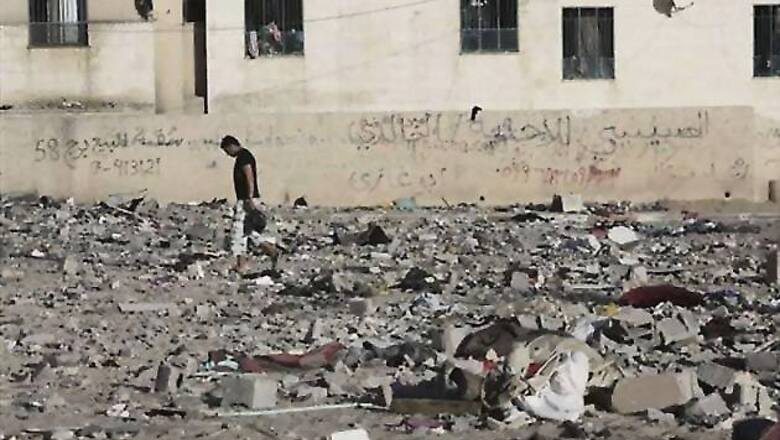
views
Gaza/Jerusalem: Israeli tanks shelled militant targets in the Gaza Strip on Monday and a woman died in an air strike after the bloodiest day of a nearly two-week military offensive that showed no signs of abating, despite global calls for a truce.
Palestinian health officials said the death toll since July 8 had reached 447, including many civilians, with a woman killed in the predawn strike in Beit Hanoun and 12 more bodies recovered from the embattled Shejaia neighborhood where the number of fatalities rose to 72 from Sunday's fighting.
In its push against militants in Shejaia, Israel also suffered its worst losses in the offensive it launched to stop rocket fire from Gaza, with 13 soldiers killed, for a total of 18 and two more civilian deaths.
Israel's army said it had been targeting militants from Gaza's dominant Hamas group, charging that they fired rockets from Shejaia and built tunnels and command centres there. The army said that it had warned civilians to leave two days earlier.
The one-day death toll was the Israeli military's highest since a 2006 war against Hezbollah guerrillas in Lebanon. It also represented the largest number of Palestinians killed since fighting began on July 8.
The Israeli military said it was checking a televised announcement in Gaza from Hamas's armed wing that it had captured an Israeli soldier during the fighting in Shejaia.
But Israel's ambassador to the United Nations dismissed the report as untrue.
"There's no kidnapped Israeli soldier and those rumours are untrue," Ron Prosor, the ambassador, told reporters, as the UN Security Council held an emergency session about the Gaza crisis.
"Qassam Brigades captured a Zionist soldier," said Abu Ubaida, the masked spokesman of the Izz el-Deen al-Qassam Brigades, the armed wing of Hamas, on Sunday.
He identified the soldier as Shaul Aron and recited what he said was Aron's identity tag number. He gave no other evidence the soldier was in the custody of the Islamist militants.
Aron would be the first Israeli soldier held captive in Gaza since 2011, when Israel released more than 1,000 Palestinian prisoners to free Gilad Shalit, a soldier who was held for more than five years after his 2006 capture in a cross-border raid.
The bloodshed in Shejaia, the worst for the Palestinians in 12 days of conflict, has touched off renewed Western efforts to seek a truce to resolve the crisis.
US Secretary of State John Kerry was to travel to Cairo on Monday to meet Egyptian officials about the crisis, spokeswoman Jen Psaki said in a statement, adding that the United States was deeply concerned about the risk of further escalation and was pushing for a ceasefire.
Earlier on Sunday, Kerry had said he supported Israel's efforts to destroy tunnels it says Gaza militants use for infiltration attempts and to hide weapons.
Egypt, Qatar, France and the United Nations have all been pushing, with little sign of progress, for a permanent ceasefire in the worst surge of Israeli-Palestinian fighting in two years.
Qatar was due to host a meeting between Palestinian President Mahmoud Abbas and UN Secretary-General Ban Ki-moon on Sunday, and also with Hamas leader Khaled Meshaal, a senior Qatari source told Reuters.
'Open wound'
Ban, in Doha, described the fighting in Gaza as an "open wound" and urged, "We must stop the bleeding now." He was due to travel to Kuwait, Egypt, Israel, the Palestinian Territories and Jordan during the week, the United Nations said in a statement.
Residents fled Sunday's fighting along streets strewn with bodies and rubble, many of them taking shelter in Gaza's Shifa hospital.
Thousands streamed out of Shejaia, some on foot and others piling into the backs of trucks and sitting on the hoods of cars filled with families trying to get away. Several people rode out of the neighbourhood in the shovel of a bulldozer.
The Shifa hospital director, Naser Tattar, said 17 children, 14 women and four elderly were among 62 Palestinians killed, and about 400 people were wounded in the Israeli assault.
Palestinian fighters kept up rocket fire at Israel on Sunday, though the salvoes seemed fewer than on previous days.
The Israeli military said 87 rockets were launched from Gaza at Israel on Sunday, and 16 were harmlessly shot down by an Iron Dome interceptor system. The numbers of such shootings have topped 100 on previous days of the offensive.
Israel would press on with its campaign with the goals of "restoring quiet" to its southern cities and the Tel Aviv business area, Prime Minister Benjamin Netanyahu told a news conference on Sunday evening.
Israel also sought to "significantly" damage Hamas and other militant groups' infrastructure in Gaza, he said, adding: "We are undeterred. We shall continue the operation as long as is required."
The Israeli military said it beefed up its presence in Gaza on Sunday, with a focus on destroying missile stockpiles and the vast tunnel system Hamas built along the frontier with Israel.
"I estimate that within two or three days the major part of the tunnels will have been destroyed," Israeli Defense Minister Moshe Yaalon told the news conference where Netanyahu spoke.
The UN Relief and Works Agency said 81,000 displaced people had now taken refuge in 61 UNRWA shelters in Gaza.
The Western-backed Abbas in April struck a reconciliation deal with Hamas, which seized the Gaza Strip in 2007 from forces loyal to his Fatah movement. The agreement led to the formation of a Palestinian unity government and Israel's pullout from US-brokered peace talks.



















Comments
0 comment